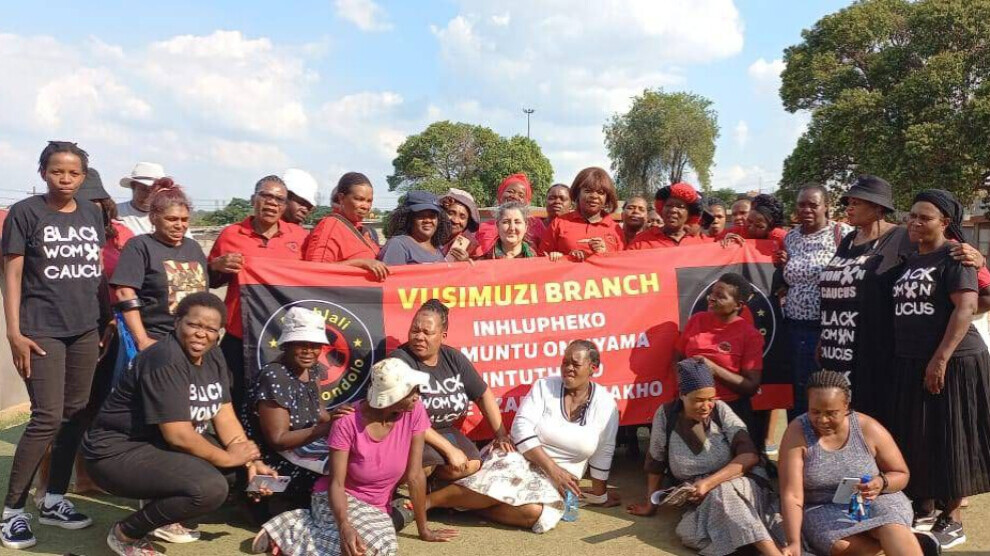Jineoloji workshop in Johannesburg
A workshop was organized in Johannesburg by the Jineoloji Academy. Many women's organizations and groups attended the meeting.
A workshop was organized in Johannesburg by the Jineoloji Academy. Many women's organizations and groups attended the meeting.

On February 8, 2025, ILRIG, along with the Jineoloji Academy, Abahlali baseMjondolo, Tembisa, and Eva Hoffman Abahlali Base Freedom Park Women's Group, gathered at a school run by the Malawian community in Vusumuzi, Tembisa, a large occupied area in northern Johannesburg, predominantly inhabited by black working-class people.
Before the meeting, 4 women from the above organizations who presented on issues of land and space provision (occupation struggle), women's collectives, communes, and joint cooperation efforts in their community: Melita Ncobo from Abahlali baseMjondolo Tembisa; Phumza Dumbata, Necibe Qeredaxi, and Lara Reddy held a video conference to get to know each other and make preparations. Together, we organized the meeting. Another organization fighting against gender-based violence (Black Women Caucus) also participated with energy, enthusiasm, and positive contributions.
It's worth noting that in South Africa, there is a high rate of violence, murder, and sexual assault against women, and it's always safer for women to travel in groups. Due to transportation issues in South Africa and the particular geography of apartheid, travel is very difficult for poor black women.

The topics were moderated by Melita, and representatives from organizations and academies presented on women, land, collectives, and women's general struggle. In the workshop, Jineoloji captured the attention of Johannesburg women.
Lara Reddy said, "I spoke with Johannesburg women and informed them about what I learned from reading Öcalan and the education of the Academy of Democratic Modernity, and from their exchanges last year with South African women, but learning from the Jineoloji Academy itself was very interesting and authentic for the women. The women asked interesting questions, although I feel there is still much they need deep, focused education on. Women's environments are different, but our situations are similar. We lack the level of autonomous self-organization that Kurdish women have managed to build, and through this deep understanding of how women were first colonized in mind, body, and spirit, and women's revolution is against colonialism through organization and education."
Women and women's organizations, despite the neoliberal system, face socio-economic obstacles, poverty, violence, and patriarchy in South Africa. This makes analyzing these issues and the cultural and historical realities of African women an absolute necessity. Especially those in Johannesburg, the economic center of South Africa that contains most urban working women, from students to agricultural women, from academic and professional to women trapped in the snares of capitalism, migrant and precarious workers to housewives - we all face the same scourge of patriarchal violence wherever we are, and our land and livelihoods are threatened.
Lara Reddy says, "The presentation of Jineoloji opens up paths to radical democracy, women's democratic confederalism, and its opportunities for seeing roles and imagining a third way, self-organization, through organizing communes and assemblies and women's communication networks at local, regional, and international levels. Women's liberation struggle is universal but starts at the local level."
In the seminar discussion section, women pointed out that there are small steps to reshape these old understandings for a new feminist future, experience and sharing, learning, supporting women in communities, building comradeship and working together. They indicated that there are many problems, patriarchal control, women's deep pain from childhood trauma and also historical and ancient pain of apartheid, racism, killing, poverty that is the life of black women - who in this society have faced the most exploitation and oppression but are the strongest, most resilient, and most sacrificing women.
Women insist that we must also educate those men who treat us as "second-class citizens" and still want to control our behavior and sections, and who feel threatened by our gatherings.
What drew me and women towards Jineoloji, in South Africa's patriarchal situation, is approaching feminism not from a Western framework when they say, "It's not our duty to change men, they must change themselves." Because patriarchy has been a destructive and limiting force for men too, and men's ego was built on making women property, when women's power was stolen, they must make waves and launch revolution. The waves of change that come through a deep understanding of ourselves, others, and the spaces we find ourselves in, and when we find our place in the world, we can begin struggling to reach our truth.
In response to Jineoloji Academy member Necibe Qeredaxi's question to Nosipho Twala is an educator and researcher at Labour Research Service "Where do we start?" she said telling historical memories and organizing ourselves to respond to our needs is like the unwritten stories grandmothers tell us around fire and food, planting a seed for self-organization. All these ideas in Jineoloji lead women to gain an understanding of themselves, but also an understanding that they are not separate, they are part of a whole where we each build our free life and our society together.